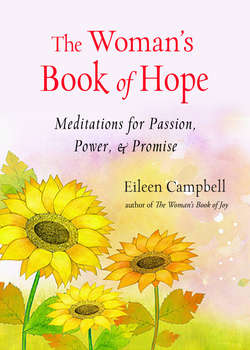Читать книгу The Woman's Book of Hope - Eileen Campbell - Страница 10
На сайте Литреса книга снята с продажи.
4. Dreaming the impossible dream
ОглавлениеWhat is it we most long for? Most of us want good relationships, a comfortable home, a rewarding career, good health, but probably much more besides—and there's nothing wrong with that! We're all entitled to dream, we don't need permission, and neither do we have to prove anything. Basically, we want what will make us happy. Sometimes, however, we have a burning desire to do something that may seem impossible and that others might regard as a foolish dream. We have to take that passionate desire and make it our quest, no matter how difficult it might seem to reach our goal.
Dreams are expressions of hope, and how our lives unfold depends on our dreams. When our imagination is fired by them, we're lifted to new heights, and we can overcome those patterns of thoughts and beliefs that so frequently hold us back and prevent us from realizing our dream.
“The future belongs to those who believe in the beauty of their dreams,” wrote Eleanor Roosevelt, who in spite of her privileged position as the wife of US President Franklin D. Roosevelt had her share of misfortunes and is to be admired for how she coped with them. She campaigned throughout her life for human rights and as head of the United Nations Commission on Human Rights helped draft the 1948 declaration of human rights.
Doreen Peachy did not have a privileged background, but she had dreams. When she grew up in the 1950s in England, there wasn't enough money in her family to pay for ballet lessons, but she always wanted to be a ballerina. When she was seventy-one, she became the oldest woman ever to pass the grade six exam at the Royal Academy of Dance in London. Having had a successful career, she was able to fulfill her dream by taking up ballet when she had retired ten years earlier.
My own experience with singing is not dissimilar. I always loved to sing, but there was no money for music training when I was young. I put all my energy into getting an education and a career, and it never really occurred to me that I could take up singing without a music background, but the dream never left me. It was not until I was fifty, after many years of going to India, that through a curious serendipity I became involved with classical Indian raga. Indian music and the way it is traditionally taught, totally by listening and by repetition with no need for musical notation, suited me perfectly. Because I had studied Sanskrit, singing in different Indian languages wasn't really a problem; I seemed to be able to pick them up enough to be able to sing in them. After many years of practice now, learning different styles with several Indian teachers, I have become reasonably proficient, even performing on stage in both London and India. It's clearly never too late to fulfill an impossible dream!
I allow my imagination to run free.
I know that what I long for is attainable.
I believe my dreams are being realized.
